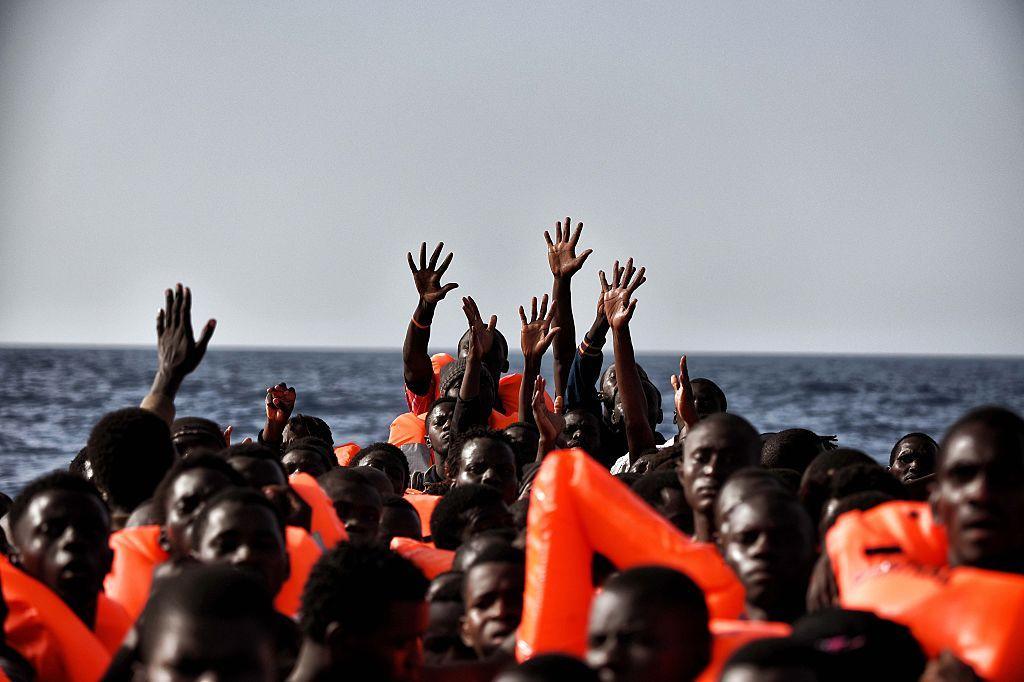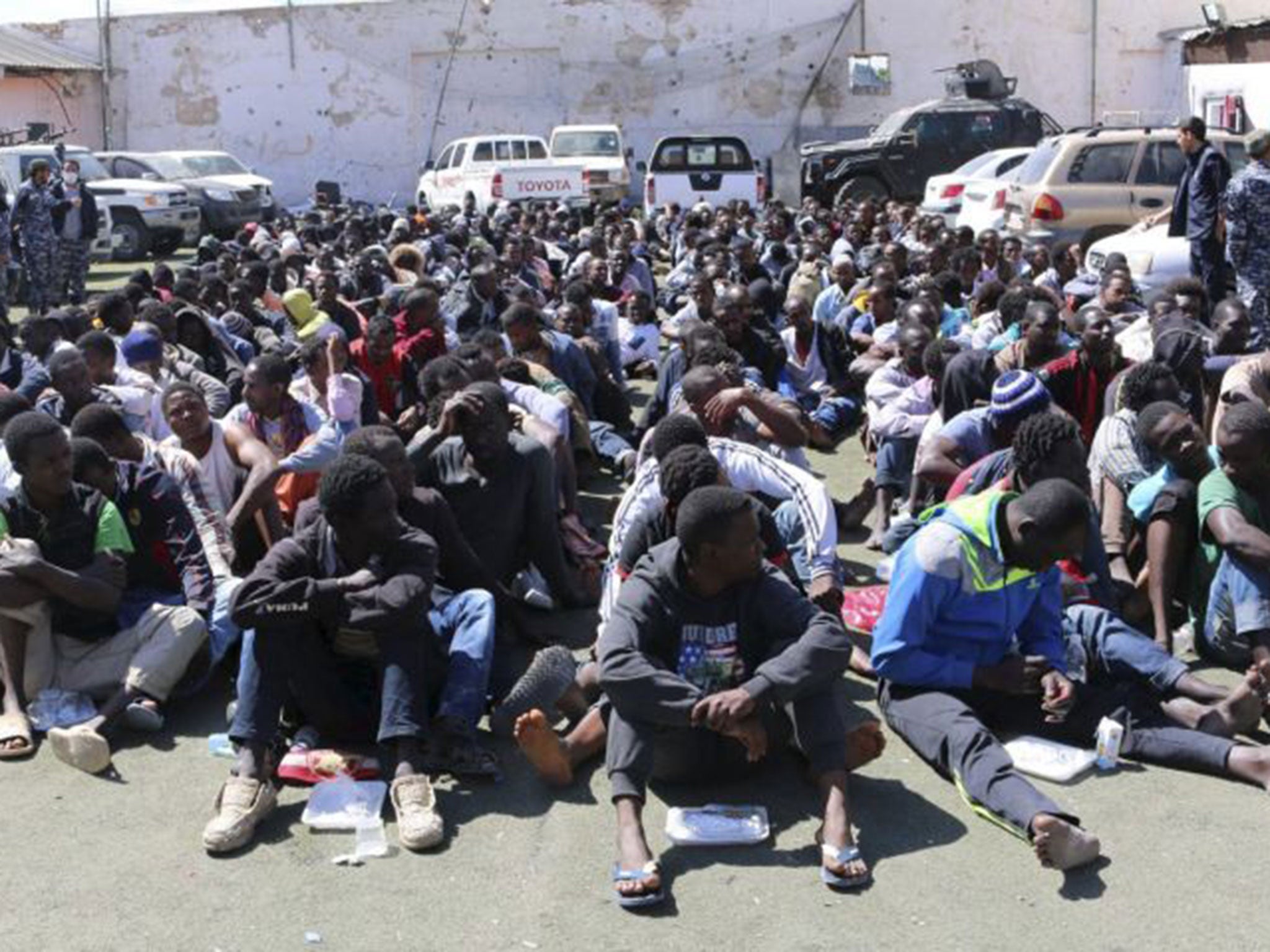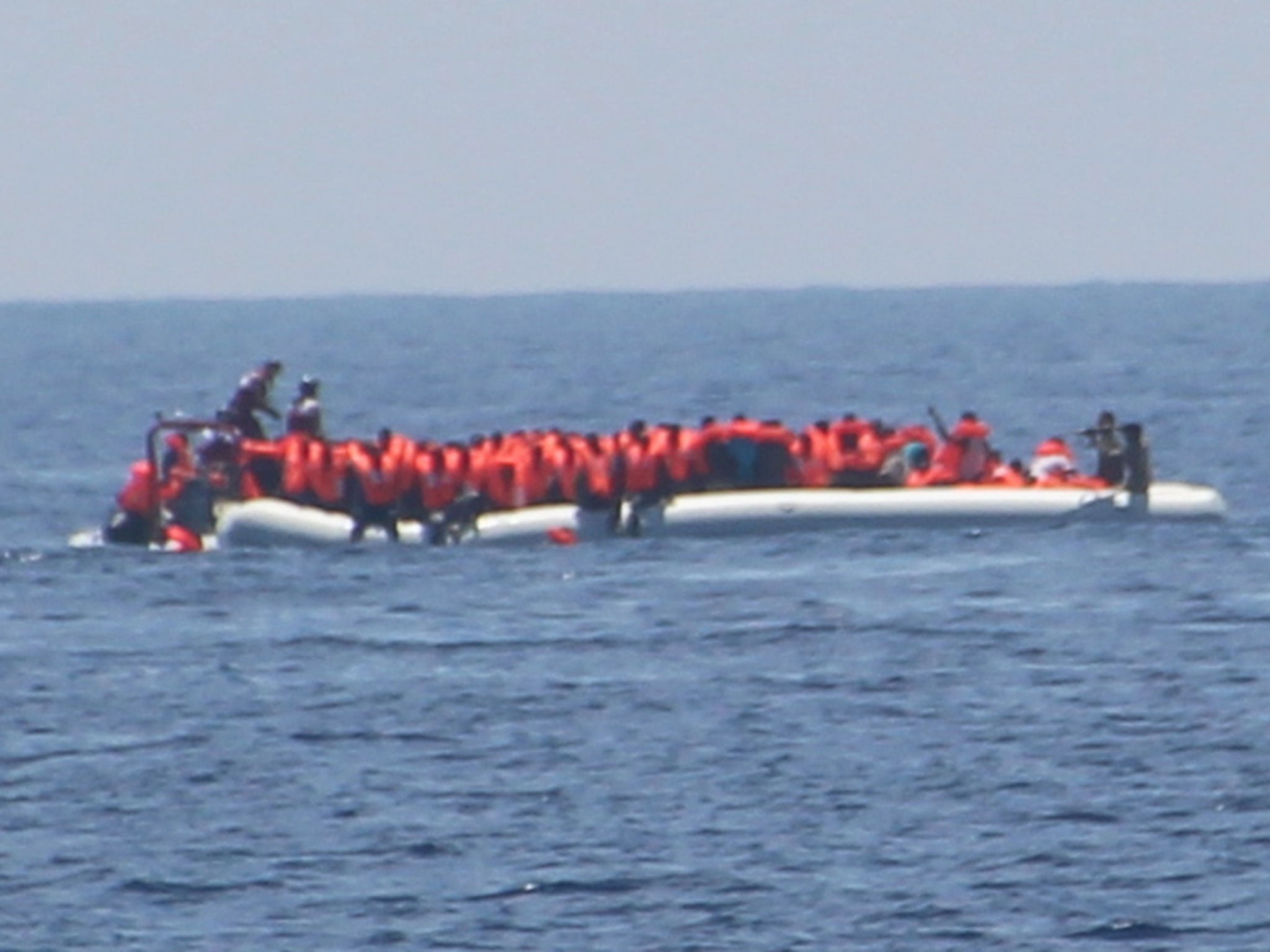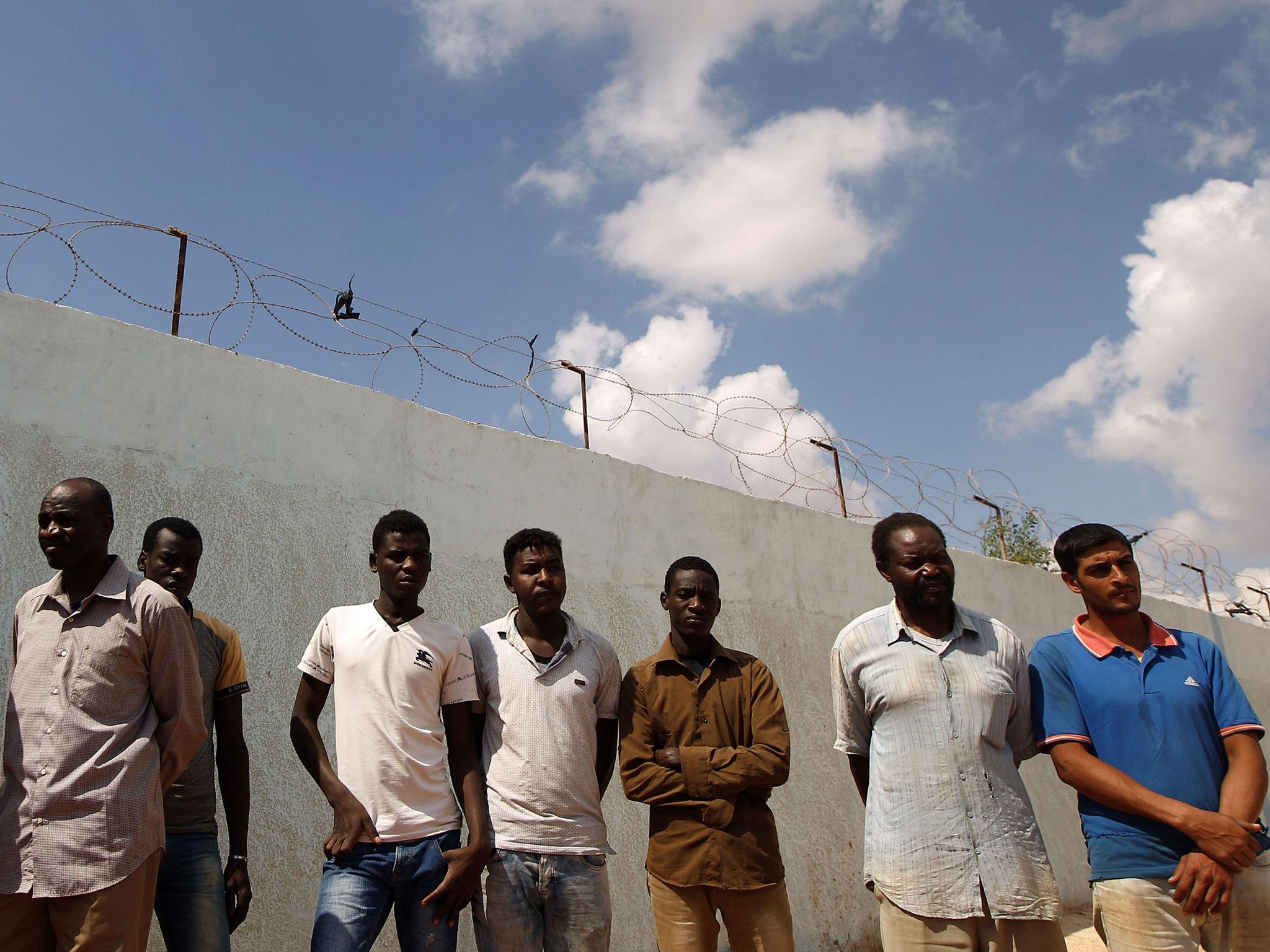EU helping force refugees back to ‘hell on Earth’ in push to stop boat crossings from Libya, report finds
Researchers say EU is disregarding international law and human rights

Your support helps us to tell the story
From reproductive rights to climate change to Big Tech, The Independent is on the ground when the story is developing. Whether it's investigating the financials of Elon Musk's pro-Trump PAC or producing our latest documentary, 'The A Word', which shines a light on the American women fighting for reproductive rights, we know how important it is to parse out the facts from the messaging.
At such a critical moment in US history, we need reporters on the ground. Your donation allows us to keep sending journalists to speak to both sides of the story.
The Independent is trusted by Americans across the entire political spectrum. And unlike many other quality news outlets, we choose not to lock Americans out of our reporting and analysis with paywalls. We believe quality journalism should be available to everyone, paid for by those who can afford it.
Your support makes all the difference.A new report has accused the EU of disregarding human rights and international law in its desperation to slow refugee boat crossings across the Mediterranean Sea.
The bloc has pledged tens of millions of euros in funding for authorities in Libya, despite the country’s ongoing civil war and allegations of torture, rape and killings earning it the moniker “hell on Earth” among migrants.
Research by the US-based Refugees International (RI) group warned that the EU’s push to prevent boats leaving the Libyan coast – now the main departure point towards Europe – could fuel horrific abuses.
“The fate of people who are seeking international protection is effectively absent from the plans outlined by EU leaders to tackle the Central Mediterranean route,” its report concluded.
“With the ongoing violence and chaos in Libya, a country that lacks an asylum system and where the rule of law is absent, EU countries must accept people on their territory through orderly, legal processes that are viable alternatives to ruthless criminal networks.
“The EU and its member states should also ensure that their funding and actions in Libya do not result in or contribute to human rights abuses against refugees and migrants.”

Researchers gathered harrowing testimonies from asylum seekers who had managed to survive the crossing to Europe, which has claimed a record of more than 1,700 lives so far this year.
Among them was Ali, a 17-year-old boy from Gambia who was detained in what he believed was an official detention centre in Zawaiya.
He said UN workers brought food, clothes shoes and other supplies, which were then sold for profit by guards who gave detainees only one portion of bread and a handful of pasta each day.
“The Arab people working in the prison, if someone is sick, they finish them off,” Ali told Refugees International.
“They beat a boy, he vomited blood. I saw it in front of my eyes.”
When another man died after a severe beating, the teenager and other migrants were ordered to bury his body themselves in a shallow grave outside.
During his detention the “boss” of the prison also forced people into to build a house, which Ali and four others did – unpaid – until they were allowed to leave detention and attempt the journey to Europe.
It is one of numerous accounts of forced labour in Libya, where the International Organisation of Migration warned people were being openly traded in “slave markets”.

Smugglers and armed gangs have exploited lawlessness, since the UK and France led a military campaign to oust Muammar Gaddafi, to expand their ruthless trade, and it is frequently unclear whether squalid detention centres are run by officials, militias or both.
Ali had already been forced back to Libya once after his boat was intercepted by the Libyan coastguard, which has recently been filmed firing into the air during “rescues” and cutting across humanitarian ships, after allegedly causing drownings and opening fire on a Médecins Sans Frontières (MSF) vessel.
Ali said the armed guards who boarded a dinghy he was travelling on in November 2016 demanded money before “they started to beat people with the guns. They hit me on my head with their guns.”
Humanitarian groups say forcing people back to Libya from international waters is a violation of international law, particularly “non-refoulement” principles that prohibit people being returned to a country where they face torture or other ill-treatment.
But despite training and equipping the Libyan coastguard, the EU appears to have made no move to censure it for venturing outside territorial waters and has not publicly condemned numerous clashes with international ships deployed by commanders in Rome.
As well as torture and killings in detention centres, RI said women and girls in Libya are at particular risk of widespread sexual abuse.
Rape is so prevalent among migrants in Libya and on journeys to it that some women passing through Ethiopia or Sudan are given a contraceptive injection, but many of those arriving on boats to Italy are pregnant.
Juliette, a 25-year-old woman from Cameroon who spent four months in Libya, told RI that “when someone kidnaps you, he can call his brothers” to tell them he has women and girls.
“In front of me, men came to take girls away to rape them,” she added. “Especially Nigerian girls.”
A teenage boy from Ghana said Libyan guards at his detention centre took women away one by one to rape, passing some on to be taken away overnight by unidentified men.
An Eritrean man who had been held by smugglers near Tripoli, said Libyan men abducted a 21-year-old-woman, who later died days after finding out she was pregnant.
In some cases, sexual abuse is used as an alternative to large bribes for release, while other migrants are extorted and forced to call family members abroad for payment.
Izza Leghtas, RI’s senior advocate for Europe and the author of the report, said EU countries know “full well” the dire conditions faced by migrants.
“EU countries can’t send refugees and migrants back to Libya without violating international law, so they’re empowering the Libyan authorities to do so instead,” she added.
Ms Leghtas said abuses by smugglers were well-known but the report’s findings on official detention centres were “particularly worrying” given rising international support.
“The Europeans are so focused on closing down this route that they’re not being responsible,” she told The Independent.
“You can’t tackle one piece the crisis [by stopping sea crossings] and then not follow through.
“The EU should be doing everything it can to help people who are escaping this nightmare.”
RI’s report called on the EU to urge Libya to end the criminalisation of migration, open detention centres and ensure returned refugees are registered and treated in accordance with international law, while calling for a UN investigation into alleged sexual abuse at detention centres.
A spokesperson for the European Commission said it was unable to comment on the findings before formally receiving the report.
Brussels is supporting initiatives led by Italy to strengthen cooperation with Libya’s fragile UN-backed Government of National Accord – one of two governments still vying for power in the country.

Following a show of commitment at a summit attended by EU leaders in Malta in February, a €90m (£80m) programme to “reinforce protection and resilience of migrants, refugees and host communities in Libya” was adopted last month.
More than half of the funds are allocated to disembarkation points for migrants forced back by the Libyan coastguard, detention centres, healthcare, protection for vulnerable groups and 15,000 “voluntary humanitarian returns” to countries of origin.
The plan envisions the creation of unspecified “safe spaces” as an alternative to detention – although it was unclear how they would be created – assistance and information at transit points and increased monitoring of migration flows.
Another €42m (£37m) is going to “socio-economic development” for Libya’s Government of National Accord (GNA), which is itself accused of working with smugglers and militias, as well as perpetrating abuse in detention centres including torture and murder.
The plan – to be implemented by UN agencies – proposes “quality services” for Libyans and migrants, including health centres, education and jobs, although deep-seated prejudice against sub-Saharan Africans sees them regularly denied access to current facilities.
Ms Leghtas said the plans were “disconnected from the reality on the ground”, pointing out that many of the UN’s own workers are stationed in neighbouring Tunisia because Libya is considered so dangerous.
“A lot more needs to be done to address this emergency,” she added. “For refugees, Libya is death and torture – that is what they are fleeing.”
A spokesperson for the Libyan interior ministry did not respond to The Independent’s request for comment but Jalal Othman, director of communications for the GNA, previously said authorities are “facing immense challenges” and lack funding, equipment and training.
He added: “We completely deplore any violence against migrants."
Join our commenting forum
Join thought-provoking conversations, follow other Independent readers and see their replies
Comments